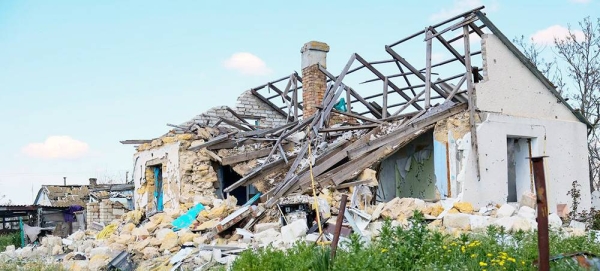
Raouf Mazou, UNHCR assistant high commissioner, laments killing of 2 Lebanese colleagues in Israeli strikes last week
‘We all become numb. There’s a new conflict, there’s a new crisis — we simply do not have the normal reaction of outrage that we should normally have’
NEW YORK CITY: With the Lebanese prime minister warning that up to 1 million people might be displaced amid war in his country, a top UNHCR official has sounded the alarm on the “numbing” of the world to human suffering, and the difficulty of responding to crises in Lebanon, Sudan and elsewhere.
A “massive increase in displacement” is taking place in Lebanon, warned Raouf Mazou, UNHCR assistant high commissioner for operations, appealing for the international community to overcome its crisis fatigue and support a humanitarian response to the conflict.
He was speaking to Arab News in New York City on the sidelines of the 79th UN General Assembly.
It comes as Israel ramped up its aerial campaign against Hezbollah across Lebanon, with strikes into the heart of Beirut and elsewhere killing hundreds of people last week.
The escalation has compounded woes for the UN’s refugee agency, which is battling crises in some of the world’s most impoverished and conflict-ridden countries.
Two of its workers were killed last week in Lebanon. The agency said it was “outraged and deeply saddened” by the deaths.
Dina Darwiche, from the UNHCR’s Bekaa office in the country’s east, was killed alongside her youngest son as an Israeli missile struck her home on Monday.
Ali Basma, who worked with the UNHCR’s Tyre office in the south, was also confirmed dead on Monday.
“On our colleagues, it’s the drama of the context where civilian populations are the victims of indiscriminate bombing, indiscriminate airstrikes — this is what we’re observing,” Mazou told Arab News.
“They were not at work at the time when it happened. They were living their normal lives. But it reminds us of how civilians are exposed. In addition to that, we also have situations where colleagues in the course of their duty are targeted or find themselves killed.
“And that’s another concern that we have. Humanitarian workers being exposed to danger as they are performing their functions.
“In this specific case it wasn’t — they were not at work — but still, this is something that, to us, of course, is extremely concerning.”
The escalation in Lebanon is “not something the world needs right now,” Mazou added, warning that the “massive numbers” being displaced in the country also includes the 80,000 Lebanese who fled to neighboring Syria in the past week, according to the government.
In response to the conflict, the UNHCR is executing its contingency plans and beginning distribution of pre-positioned aid, but urgently needs assistance as part of a wider international response, Mazou said.
The body will also “strengthen its presence” to protect the most vulnerable, he added.
But with conflicts in the region already raging in Sudan, Gaza, Syria and Yemen, there is a “difficulty” in mobilizing adequate resources for Lebanon, the assistant high commissioner said.
“We have core relief items already pre-positioned in the region which we can give fairly fast. We have the presence of colleagues. The presence of colleagues is absolutely essential. There are many other items that are necessary and which we will provide,” he added.
“We are now coming up with an appeal that we are going to issue, to ask for support from the international community.
“But that is happening at a time when it is already difficult to mobilize resources. There are many other crises around the world, so it’s already difficult. And now we have another crisis added to the to the existing one.
“So, we’re very worried. We hope we will be able to mobilize, but we are really appealing to the international community to provide the resources that are required.”
For Mazou, the proliferation of conflict has not only tested the logistical strength of the UNHCR, but has also “numbed” the global community to human suffering.
“We all become numb. There’s a new conflict, there’s a new crisis — we simply do not have the normal reaction of outrage that we should normally have,” he said.
The result is that many of the countries receiving refugees from the world’s conflicts — some of which are already impoverished and unstable — are unable to provide sufficient protection and support.
Host countries are often “in very difficult situations” themselves, and, faced with accepting millions of refugees, are too often left to handle the problem alone, Mazou said.
“They provide a global public good by receiving refugees, but they need the support of the international community. If you don’t give that support, at the end of the day, it’s the victims who are again exposed to more danger.”
Chad, for example, hosts about 2 million refugees, including from Sudan.
“That is completely untenable for a country that is fairly poor and also a country that is suffering from the economic impact of the war in Sudan. The whole eastern part of Chad was depending on Sudan now finds itself in a situation where it can no longer benefit from the economic trade that was taking place.
“It’s the countries which are receiving these refugees, whether it is Chad, whether it is the Central African Republic, whether it is Libya, whether it is Egypt — countries which are struggling in providing the protection and the system that is required. They need the support of the international community,” Mazou said.
A lack of international support in the humanitarian response to crises has dire effects on the ground, meaning a greater risk of famine, sexual violence against women and children losing access to education, Mazou warned.
“What are the consequences? The consequences are that you do not provide the basic assistance that is required, whether it is food assistance with the risk of famine, women finding themselves exposed to sexual violence or children who absolutely do not have access to school. Children in Sudan have not had access to school for all this time.”
The civil war in Sudan has pushed the UNHCR’s mandate to its limit.
After 17 months of conflict, the country is now victim to the world’s worst hunger crisis, and humanitarian agencies are struggling to respond.
More than 10 million people have been forcibly displaced from Sudan, pushed into neighboring countries and beyond, with the UNHCR recently declaring emergencies in Uganda and Libya related to the conflict.
At the UN this week, Filippo Grandi, the UNHCR’s high commissioner, recounted two visits to the country earlier this year, describing conditions there as “apocalyptic” and urging donors to fill the “severely underfunded” response plan.
“I can frankly hardly think of any other conflict where our, by now, chronic inability to bring about peace is so much in evidence — is more in evidence than the Sudan conflict,” he said.
“If people don’t die because of bullets, they starve to death. If they manage to survive, they must face disease or floods or the threat of sexual violence and other horrifying abuse, which if perpetrated in other places, would make daily headlines. It doesn’t in this situation.”
With famine declared at a displacement camp within El-Fasher in North Darfur, the UN’s main food relief body, the World Food Programme, is struggling to deliver aid to the country amid blocking by government forces and their Rapid Support Forces paramilitary rivals.
Humanitarian workers operating in the country have also been targeted or killed in deliberate attacks.
For Mazou and the UNHCR, opening access to aid in Sudan is of the utmost priority.
“For us, it’s first making sure that humanitarian access is granted. We’ve been talking to the parties to the conflict. They know that they have the responsibility, they have accountability that they must provide humanitarian access. But that’s something that we keep on repeating,” he said.
“And then we need to have the resources to make sure that we can carry the humanitarian assistance that is required to the populations in need in asylum countries first.
“I think it’s important in today’s world to underline the fact that asylum countries are willing to provide asylum, and that’s not the case everywhere,” he added, citing Chad, the Central African Republic, Libya and Egypt.
Disputes, rivalries and buck-passing among developed countries on the issue of hosting refugees has been a matter of chronic concern for the UNHCR.
Its commissioner, Grandi, as well as a host of humanitarian leaders, have long cited the contrasting reactions of many European countries to the Syrian and Ukrainian refugee crises as evidence of “double standards.”
European countries positioned on the edges of the continent — including Spain, Greece, Croatia and Italy — have engaged, openly or secretly, in violent pushback policies to turn back refugees at their borders, according to a series of reports published by Amnesty International in recent years.
In the years preceding the Russian invasion of Ukraine in 2022, many of the countries neighboring the latter had complained of an inability to shoulder the burden of hosting refugees from outside Europe, Mazou said.
But following the outbreak of the war, these countries “received several million” Ukrainian refugees, in a sign that “people do realize that it is their responsibility to provide asylum” in a crisis, he added.
“That is something that we must all underline,” Mazou said.
“Not only the high commissioner, but a number of humanitarian leaders have stressed the importance of supporting countries regardless of where they are located, to make sure that the assistance that is required is provided.”
With the UNHCR drawing on all its resources to meet the mounting demands of refugees fleeing crises around the world, Mazou highlighted international support as the backbone of his agency’s operations.
“We have to put in place mechanisms and to respond to the needs of the people,” he said.
“We continue to appeal to make sure that the needs of all refugees around the world are responded to and that we are in the position of mobilizing for all countries around the world and not just one crisis.”










